DevOps has emerged as a transformative force, merging software development and IT operations to accelerate the delivery of secure, scalable, and patient-centric digital solutions.
The global DevOps market is on a strong upward trajectory, driven by the need for faster software delivery, improved collaboration, and operational agility.
According to the business research company report, the DevOps market is projected to reach $15.06 billion in 2025, up from $12.54 billion in 2024, reflecting a 20.1% CAGR.
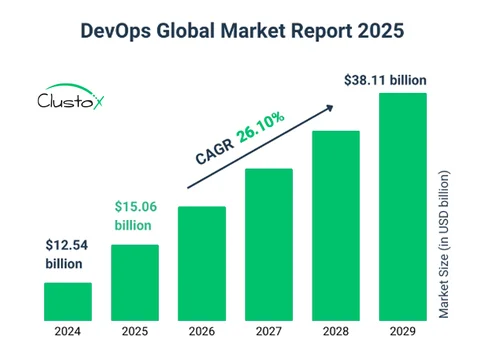
Market adoption trends show that industries worldwide are investing heavily in DevOps, with healthcare standing out for its potential to transform patient care, polish clinical workflows, and strengthen data security.
DevOps in healthcare also incorporates modern testing practices, such as test-driven development (TDD) and behavior-driven development (BDD), which are vital for ensuring the accuracy, reliability, and compliance of mission-critical systems, including diagnostic algorithms, patient monitoring tools, and telehealth platforms.
A recent industry survey shows that 73% of healthcare organizations have adopted DevOps practices, enabling faster and safer innovation in regulated environments.
This blog examines how healthcare companies are adopting DevOps in healthcare, the tools they utilize, real-world use cases, and how these best practices ensure HIPAA-compliant DevOps.
Table of Contents
Why DevOps Matters in Healthcare?
In the healthcare sector, every second counts, and dependable systems directly impact patient outcomes. When IT systems fall short, whether due to delays, bugs, or inefficiencies, it can slow down care delivery and even compromise patient safety.
That’s why many organizations are adopting a DevOps strategy in healthcare to bring speed, reliability, and consistency to their custom software development efforts.
DevOps for healthcare companies can roll out robust healthcare applications faster, benefitting both providers and the patients who rely on them.
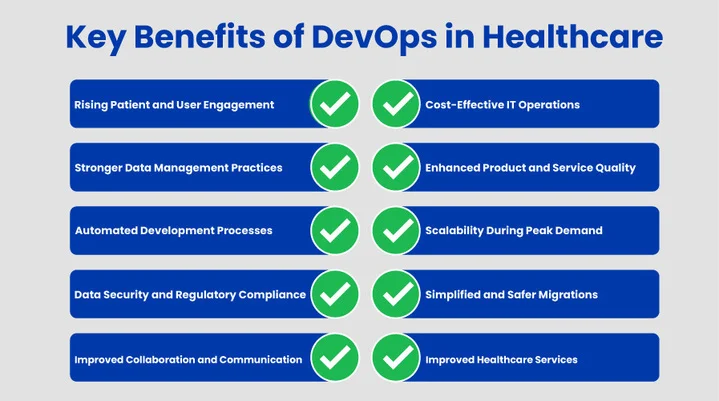
How to Get Started with DevOps in Healthcare?
To get started with DevOps in healthcare, define a compliance-focused strategy, use traceable version control, and containerize applications for scalability. Implement CI/CD with automated builds and continuous testing based on real healthcare scenarios.
Finally, incorporate secure software delivery in healthcare by establishing monitoring and feedback loops to ensure reliability, security, and ongoing improvement.
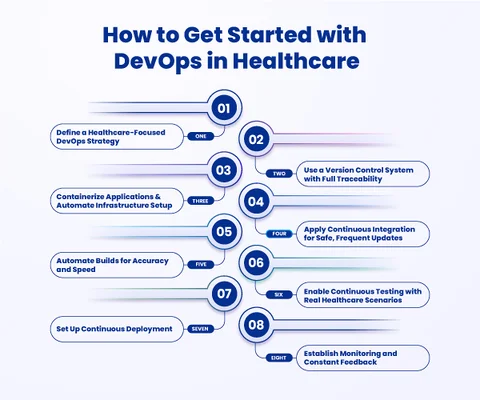
How Healthcare Companies Use DevOps: Tools & Best Practices
Implementing DevOps in healthcare isn’t just about changing workflows; it’s also about using the right DevOps tools for healthcare and technology to support fast, secure, and reliable development.
Here’s a look at the DevOps implementation in healthcare, along with the top tools for DevOps in healthcare:
1. CI/CD Automation
At the heart of DevOps are CI/CD pipelines for healthcare software, ensuring code is regularly tested, integrated, and delivered to production without delays or manual intervention.
- CI (Continuous Integration) automatically builds and tests your code every time there’s a change, catching issues early.
- CD (Continuous Delivery) takes the tested code and releases it smoothly to the production environment.
Popular tools like Jenkins, CircleCI, and TravisCI help automate continuous delivery in healthcare IT. They allow healthcare IT teams to test new features quickly and push updates securely, while also managing access control and real-time alerts. These tools can run smoothly on cloud platforms or in on-premise setups.
2. Infrastructure Provisioning & Configuration Management
Setting up servers, databases, and networking components manually is time-consuming and error-prone. That’s where infrastructure automation comes in.
- Tools like Terraform and AWS CloudFormation let teams define their infrastructure as code, so they can replicate it anytime with consistency.
- Tools like Ansible, Chef, and Puppet automate post-deployment configurations and updates.
These tools reduce human error, speed up deployment, and make it easy to scale securely, especially important in healthcare, where systems must be resilient and compliant.
3. Containers, Kubernetes & Microservices
Traditional healthcare applications are often bulky and hard to update. Moving to microservices, small, independent units of code packaged in containers, makes updates faster and safer.
- Containers (like Docker) bundle applications with everything they need to run, ensuring consistency across environments.
- Kubernetes helps manage, scale, and orchestrate thousands of these containers at once.
This setup allows developers to release new features without affecting the entire application, perfect for rolling out updates to specific parts of a healthcare system like billing, appointments, or patient records.
4. Cloud DevOps for Healthcare
Platforms like AWS, Microsoft Azure, and Google Cloud (GCP) offer on-demand access to infrastructure and tools. They remove the burden of managing physical data centers and provide built-in security and compliance aligned with healthcare standards like HIPAA.
- Services like AWS Lambda or Google App Engine let teams run application logic without managing servers.
- These platforms offer native DevOps tools for automation, monitoring, and infrastructure management, so healthcare teams can focus on building better solutions.
5. Automated Testing Tools
In healthcare, every software update must be tested rigorously. DevOps automation in healthcare makes the testing process faster, repeatable, and less prone to human error.
- Selenium is widely used for testing web-based user interfaces like patient portals.
- Tools like Postman, JMeter, and TestComplete are great for API testing, performance checks, and regression testing.
Automated testing for healthcare applications ensures that only reliable, secure code makes it into production, helping avoid system failures and compliance risks.
6. Monitoring & Observability
DevOps doesn’t stop at deployment. DevOps compliance audits and continuous monitoring help track system performance, catch issues early, and improve future releases.
- Tools like Prometheus, Datadog, Elastic Stack, and Splunk monitor everything from app speed to error logs.
- Grafana offers beautiful dashboards to visualize metrics.
- Cloud-native options like AWS CloudWatch provide real-time insights across your infrastructure.
By spotting anomalies and performance dips early, healthcare organizations can fix problems before they impact patient care or system security.
Frustrated by slow releases and compliance hurdles? Our expertise bridges the gap between innovation and healthcare regulations.
Now that you know the role of DevOps for healthcare companies, let’s explore DevOps use cases in the healthcare industry to see how it’s already making a difference.
How are Leading Healthcare Organizations Using DevOps?
Leading healthcare organizations are adopting DevOps to speed up innovation, improve reliability, and deliver better patient outcomes.
- Mayo Clinic has partnered with Google to build cloud-based data platforms and speed up the deployment of AI models into clinical workflows.
- Intermountain Health uses automation and cloud DevOps to cut app deployment times from weeks to hours and to support AI-driven healthcare solutions.
- City of Hope adopted DevOps practices to improve software delivery and analytics for cancer research and patient care.
- NHS Digital has been applying Agile and DevOps to make national health platforms more reliable and faster to update.
- UnitedHealth Group adopted Azure DevOps pipelines and automation to simplify software releases, ensuring faster and more consistent delivery.
Real-World Examples of DevOps in Healthcare
Building on DevOps best practices for healthcare shows how these principles translate into improved patient care, operational efficiency, and compliance.
These real-life scenarios show how healthcare providers are using DevOps to improve systems, speed up innovation, and deliver better patient outcomes.
Here are the real-world examples of DevOps in healthcare:
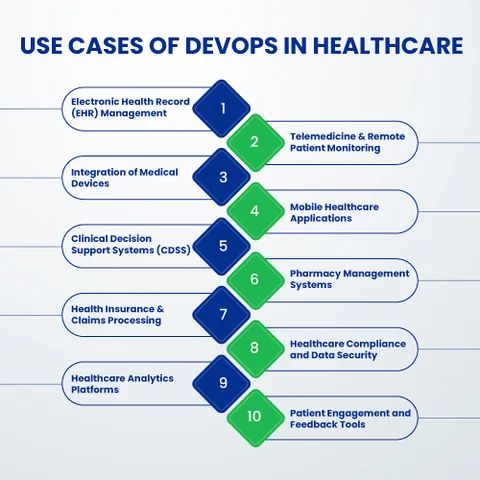
1. DevOps and EHR Systems Management
Keeping electronic health records accurate and secure is a huge challenge for healthcare providers. DevOps for electronic health records helps teams to regularly update EHR systems, making sure patient data stays current, secure, and easy to use, while also meeting compliance and usability standards.
2. Telemedicine & Remote Patient Monitoring
The rise of telehealth has made digital care the new normal. DevOps allows developers to quickly fix bugs and release new features, ensuring video calls, chat tools, and remote monitoring apps run smoothly, without compromising patient data or service quality.
3. Medical Device Integration
DevOps for medical device software in hospitals supports automated testing and deployment of device-related software, reducing manual effort and ensuring devices meet performance and safety requirements.
4. Healthcare Mobile Apps
Apps that let patients book appointments, track medications, or monitor their health need frequent updates. Secure mobile app development in healthcare through DevOps enables fast, secure rollouts of new features, bug fixes, and security patches, enhancing both user experience and patient satisfaction.
5. Clinical Decision Support Systems (CDSS)
DevOps in clinical software development in CDSS tools provides real-time, data-driven treatment recommendations to doctors. DevOps helps keep these systems up-to-date with the latest medical algorithms and data models, improving decision-making and patient safety.
6. Pharmacy Management Systems
Managing prescriptions, inventories, and regulations is complex. DevOps for medical software companies enables pharmacies to automate updates and deployments, helping reduce errors, stay compliant with changing laws, and ensure flawless operations.
7. Health Insurance and Claims Processing
Insurance providers can use DevOps to improve the accuracy and efficiency of claims processing. Continuous integration helps detect errors early, while automation speeds up approvals, leading to faster service for patients and providers alike.
8. Compliance & Cybersecurity
With sensitive patient data at stake, data protection in healthcare software is non-negotiable. DevOps security practices for healthcare apps, such as automated security testing, real-time monitoring, and patch management, help organizations stay protected and HIPAA-compliant at all times.
9. Healthcare Analytics
From patient outcomes to operational efficiency, analytics drive smarter decisions. DevOps supports rapid deployment of analytics tools, helping providers gain real-time insights, predict trends, and fine-tune care delivery.
10. Patient Engagement Platforms
Engagement tools like patient portals, feedback forms, and survey platforms need to be responsive and reliable. DevOps makes it easy to deploy updates quickly, so patients get a smoother, more personalized experience with every interaction.
These Real-world examples of DevOps in healthcare demonstrate that DevOps for health tech companies accelerates innovation and improves system reliability, but safeguarding patient privacy remains paramount, making data protection more critical than ever.
Why is HIPAA-Compliant DevOps Essential for Patient Data Security?
With healthcare data breaches rising steadily over the past decade, DevOps and data privacy in healthcare have become inseparable priorities. Organizations handling patient health information (PHI) face mounting pressure to protect sensitive records while ensuring compliance with strict regulations.
The Health Insurance Portability and Accountability Act (HIPAA), established in 1996, set clear standards for safeguarding medical information. These requirements extend beyond healthcare providers to include vendors, contractors, and all third parties managing PHI.
Compliance is not just about avoiding fines; it’s also about strengthening credibility, trust, and patient confidence. Modern healthcare organizations are increasingly utilizing DevOps and HIPAA practices together to embed compliance and security into every stage of the software development lifecycle.
Tools like Jenkins, GitLab CI/CD, Docker, and Kubernetes integrate with encryption, security scanners, access controls, and audit logging to deliver secure, automated workflows. This alignment of DevOps and patient data security enables faster innovation while ensuring that compliance is continuously maintained.
Benefits of HIPAA Compliance
HIPAA compliance goes beyond meeting regulatory requirements; it builds trust, strengthens data security, and safeguards patient privacy in the digital healthcare industry. Organizations that follow its guidelines not only avoid expensive fines but also obtain a competitive edge by increasing their operational effectiveness and credibility.
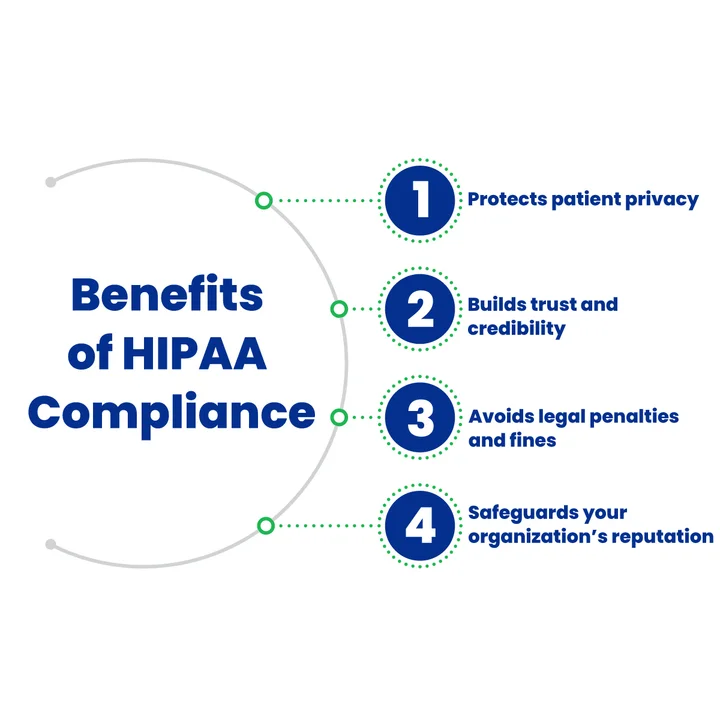
Struggling to keep patient data secure while delivering software faster? We simplify HIPAA compliance and DevOps adoption for healthcare teams.
Top 7 Security Practices for HIPAA Compliance
If you want to stay on the right side of HIPAA, here are seven proven practices to follow:
1. Start with a Risk Analysis
Before you can secure anything, you need to understand where your risks are. A risk analysis helps identify weak points in your systems that could expose PHI. Revisit this assessment regularly, especially after major changes in technology, operations, or team structure.
2. Put Technical and Physical Safeguards in Place
Technical safeguards include things like:
- Password protection
- Two-factor authentication
- Data encryption
- Firewalls and secure messaging systems
Physical safeguards are just as important:
- Security cameras and alarm systems
- Locked cabinets for physical records
- Controlled access to server rooms
- Safe transport and storage of devices or paperwork
3. Train Your Team
Every employee, from the front desk to the IT department, plays a role in protecting patient data. Regular HIPAA training ensures that everyone understands the rules and knows how to avoid accidental violations.
4. Establish Clear Policies and Procedures
Document everything, including how data is accessed, used, shared, and stored. Also, create policies for handling data breaches, incidents, and audits. Make sure every employee has access to these documents and understands their responsibilities.
5. Run Regular Audits and Monitor Systems
Keep an eye on access logs, user activity, and system performance. Regular audits and monitoring help detect vulnerabilities before they become major issues. Use tools like vulnerability scans and penetration tests to stay ahead of threats.
6. Have an Incident Response Plan
Even with defenses, no system is perfect. Be ready with an incident response plan that outlines how your team should:
- Investigate security events.
- Contain any damage.
- Notify the right authorities.
7. Work Only with HIPAA-Compliant Partners
Your compliance is only as strong as the companies you work with. Whether it’s a billing service or cloud service provider, make sure all third-party vendors are HIPAA-compliant. Sign Business Associate Agreements (BAAs) and conduct regular reviews of their security posture.
By integrating these measures with DevOps for HIPAA-compliant applications, organizations can flawlessly embed security and compliance into their development and deployment workflows.
Frequently Asked Questions (FAQs)
How Can DevOps Improve the Healthcare Software Lifecycle?
DevOps streamlines the healthcare software lifecycle by automating testing, deployment, and monitoring while ensuring HIPAA compliance. Tools like Jenkins, Docker, and Kubernetes enhance speed, security, and reliability, protecting PHI and enabling faster delivery of innovative, patient-focused solutions.
What are the Benefits of DevOps for Healthcare IT Teams?
Benefits of DevOps for healthcare IT teams include:
- Faster Software Delivery
- Improved System Reliability
- Better Compliance
- Better Collaboration
- Scalability
- Higher Quality Software
What is the Best DevOps Architecture for Healthcare Platforms?
The best DevOps architecture for healthcare platforms combines HIPAA-compliant cloud infrastructure, microservices with containerization, and automated CI/CD pipelines for rapid, reliable releases. Security is embedded through DevSecOps, encryption, and access controls. Continuous monitoring ensures uptime and quick issue resolution. Compliance automation keeps innovation fast while safeguarding patient data.
Clustox: Your Gateway to Secure Healthcare DevOps
As the healthcare industry continues to digitize and evolve, DevOps in healthcare has emerged as a critical enabler of agility, compliance, and innovation. By embracing automation, continuous delivery, and built-in security practices, healthcare organizations can accelerate software development while maintaining strict HIPAA compliance.
However, implementing healthcare DevOps solutions requires more than just adopting tools; it demands a deep understanding of regulatory frameworks, modern architecture, and collaboration-driven workflows.
At Clustox, we specialize in helping healthcare companies successfully adopt healthcare DevOps practices that are secure, compliant, and future-ready.
Our expert team is here for DevOps consulting services for healthcare that ensure speed, security, and scalability without compromising on compliance. So, partner with us for growth.
Tired of juggling outdated tools and rising security risks? We help you streamcloud service providerline systems with proven HIPAA-safe DevOps practices.



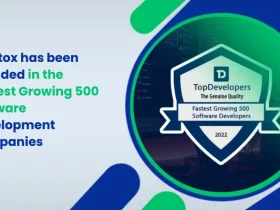
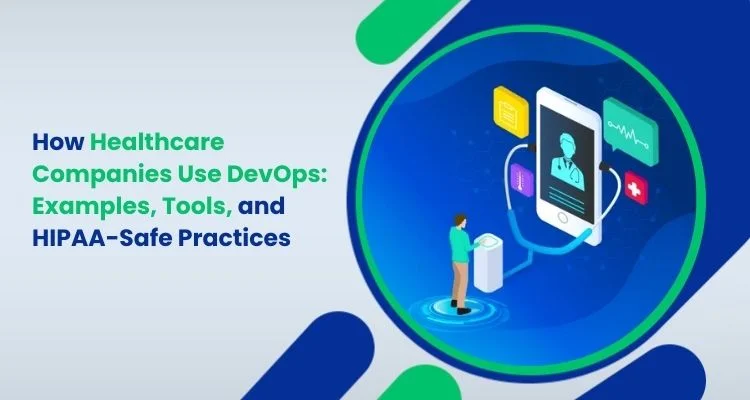
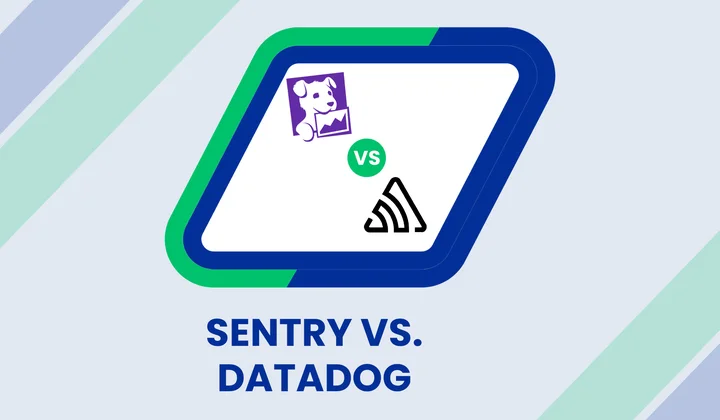

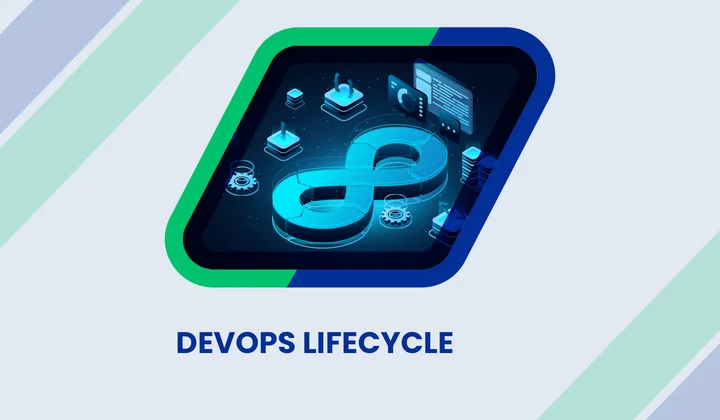
Share your thoughts about this blog!